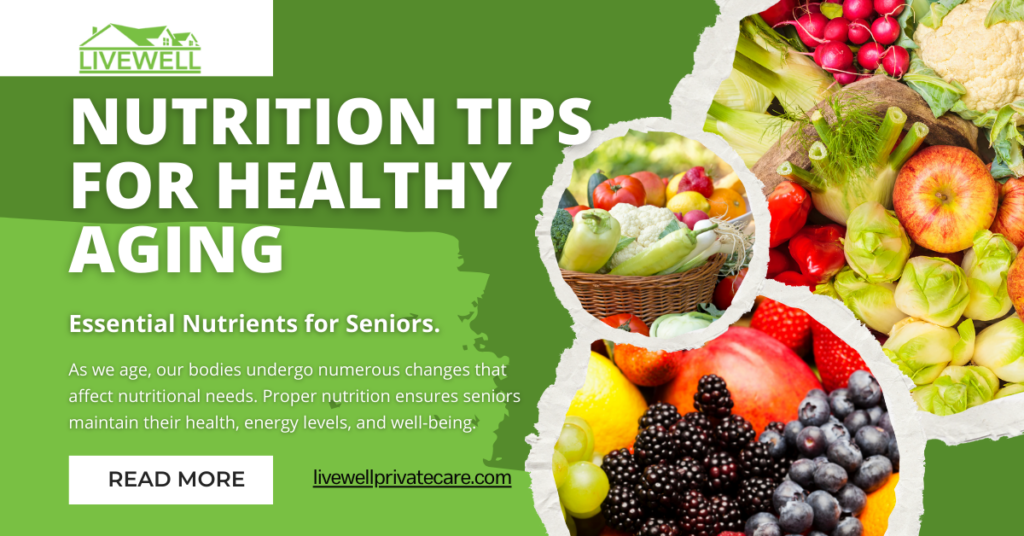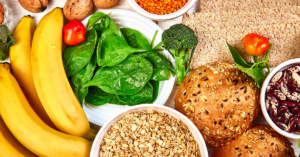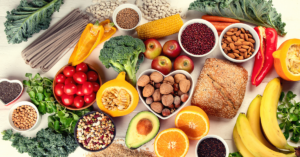Nutrition Tips for Healthy Aging: Essential Nutrients for Seniors.

Aging gracefully involves more than staying active and maintaining a positive mindset; it also requires careful attention to diet. As we age, our bodies undergo numerous changes that affect nutritional needs. Essential nutrients ensure seniors maintain their health, energy levels, and well-being.
Here are some essential nutrients that seniors should prioritize for healthy aging:
-
Calcium and Vitamin D
Calcium and vitamin D are vital for maintaining strong bones. As we age, bone density decreases, increasing the risk of osteoporosis and fractures. Seniors should aim for at least 1,200 mg of calcium and 600-800 IU of vitamin D daily, obtained from dairy products, leafy greens, fortified foods, and sensible sun exposure.
-
Protein
Protein is essential for preserving muscle mass and strength, which naturally decline with age. Incorporate a variety of protein sources such as lean meats, fish, eggs, beans, and legumes into daily meals. Aim for 1.0 to 1.2 grams of protein per kilogram of body weight daily.
-
Fiber
Fiber supports digestive health and can help prevent constipation, which is common in older adults. It also aids in managing blood sugar levels and reduces heart disease risk. Seniors should consume at least 25-30 grams of fiber daily from whole grains, fruits, vegetables, and legumes.
-
Omega-3 Fatty Acids
Omega-3 fatty acids, found in fatty fish like salmon and trout, flaxseeds, and walnuts, are known for their anti-inflammatory properties. They support heart health and brain function and may reduce the risk of chronic diseases. Aim for at least two servings of fatty fish per week.
-
Vitamin B12
Vitamin B12 is crucial for maintaining healthy nerve function and the production of DNA and red blood cells. However, as we age, the absorption of B12 decreases. Therefore, seniors should consume fortified cereals and dairy products and consider a B12 supplement if advised by their healthcare provider.
-
Magnesium
Magnesium is involved in over 300 enzymatic reactions in the body, including energy production and bone health. Good sources include nuts, seeds, whole grains, and green leafy vegetables. Seniors should aim for 320-420 mg of magnesium daily.
-
Potassium
Potassium is essential for maintaining proper cell function and reducing the risk of hypertension. It can be found in fruits like bananas and oranges, spinach and potatoes, and legumes. A daily intake of 2,600-3,400 mg is recommended.
-
Water
Hydration is often overlooked but is vital for seniors. As the sense of thirst diminishes with age, it’s essential to consume enough fluids consciously. If you are physically active, aim for at least 8 cups of water daily.
Practical Tips for Incorporating These Essential Nutrients
– Balanced Meals: Ensure each meal includes a variety of food groups. Use the plate method: half fruits and vegetables, a quarter protein, and a quarter whole grains.
– Snacks: Healthy snacks like yogurt, nuts, and fruit can help meet nutritional needs.
– Supplements: Consult with a healthcare provider about the need for any dietary supplements.
– Hydration Reminders: Set reminders to drink water throughout the day.
– Cooking Methods: Opt for steaming, grilling, or baking instead of frying to retain nutrient content.
At Livewell Private Care, we understand the importance of essential nutrients for seniors. Our caregivers are trained to assist with meal planning and preparation, ensuring our clients receive balanced, nutritious meals tailored to their dietary needs. Together, we can help seniors live healthier, more vibrant lives.
For more personalized meal plan with the essential nutrients or advice and senior care services, contact Livewell Private Care today.


